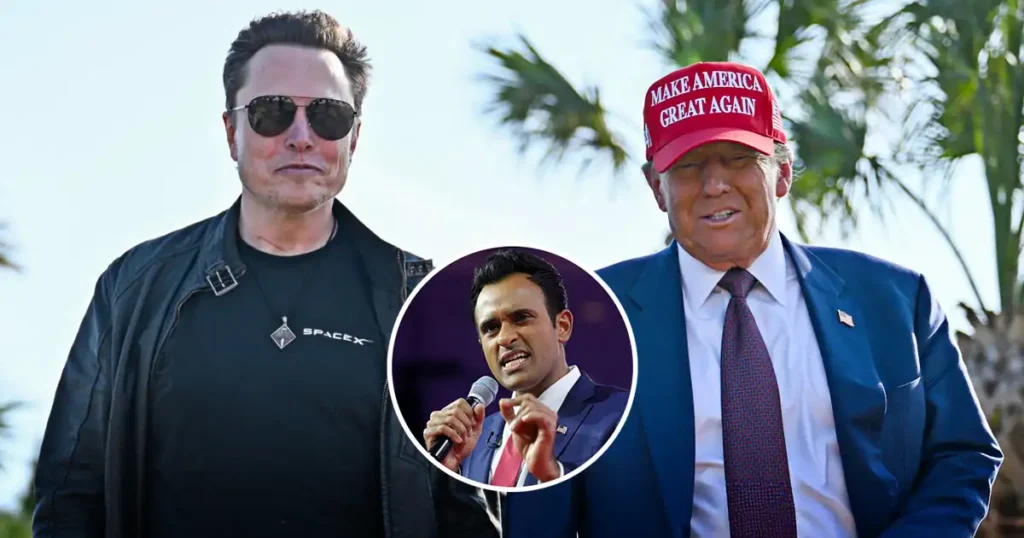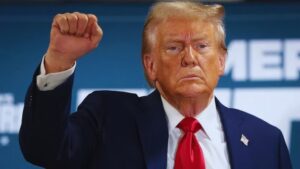In a surprising turn of events, former U.S. President Donald Trump has publicly expressed his support for the H-1B visa program, aligning himself with prominent figures like Elon Musk and Vivek Ramaswamy. His statement, calling the program “a great program,” has reignited debates about the controversial visa system, which has been a focal point of U.S. immigration policy discussions for years. The endorsement from Trump, known for his hardline stance on immigration during his presidency, has raised eyebrows and fueled conversations about the future of the H-1B program under evolving political dynamics.
Trump’s Shift in Perspective
Donald Trump’s support for the H-1B program marks a significant departure from his earlier rhetoric. During his presidency, Trump advocated for stricter immigration policies, including reforms to the H-1B program. His administration introduced measures to tighten eligibility criteria and reduce perceived abuses of the system, emphasizing the need to prioritize American workers.
However, Trump’s recent remarks suggest a nuanced perspective. Speaking at a public event, he stated, “The H-1B program brings in some of the brightest minds from around the world. It’s a great program when used correctly, and I believe it has tremendous potential to benefit our country.”
This shift in tone aligns with the views of tech leaders like Elon Musk and entrepreneur Vivek Ramaswamy, who have consistently championed the H-1B program as a critical tool for maintaining America’s competitive edge in the global technology landscape.
The Role of Elon Musk and Vivek Ramaswamy
Both Musk and Ramaswamy have been vocal advocates of the H-1B visa program, emphasizing its importance in attracting top-tier talent to the U.S. tech industry. Musk, the CEO of Tesla and SpaceX, has frequently highlighted the contributions of foreign-born engineers and scientists to his companies. Ramaswamy, a biotech entrepreneur and political figure, has echoed similar sentiments, advocating for a merit-based immigration system that prioritizes high-skilled workers.
In recent months, Musk and Ramaswamy have publicly defended the H-1B program against criticism, arguing that it is essential for innovation and economic growth. Their stance has gained traction among industry leaders and policymakers, creating a renewed focus on the program’s benefits.
Understanding the H-1B Program
The H-1B visa program allows U.S. employers to hire foreign workers in specialty occupations requiring advanced skills. These roles are often concentrated in fields such as technology, engineering, medicine, and finance. The program has an annual cap of 85,000 visas, including 20,000 reserved for applicants with advanced degrees from U.S. institutions.
Despite its benefits, the H-1B program has faced criticism for alleged abuses, such as undercutting domestic wages and displacing American workers. These concerns have fueled calls for reforms, making the program a contentious issue in U.S. immigration policy.
Trump’s Alignment with Industry Leaders
Trump’s endorsement of the H-1B program aligns him with Musk and Ramaswamy in advocating for policies that attract global talent to the U.S. tech sector. This alignment reflects a broader recognition of the program’s role in fostering innovation and sustaining economic growth.
Economic Benefits
Trump’s acknowledgment of the H-1B program’s economic benefits underscores its significance in maintaining America’s global competitiveness. Foreign workers on H-1B visas often contribute to groundbreaking advancements in technology, healthcare, and other critical industries. By attracting the best and brightest from around the world, the program helps drive economic growth and innovation.
Addressing Skill Gaps
Another key argument in favor of the H-1B program is its role in addressing skill gaps in the U.S. labor market. Despite efforts to bolster domestic STEM education, the demand for skilled professionals continues to outpace supply. H-1B workers help fill these gaps, ensuring that American companies can remain leaders in their respective fields.
Challenges and Criticisms
While Trump’s support for the H-1B program has garnered praise from some quarters, it has also reignited criticisms. Opponents of the program argue that it can be exploited by employers to replace American workers with cheaper foreign labor. High-profile cases of alleged misuse, such as U.S. workers being asked to train their H-1B replacements, have fueled skepticism about the program’s implementation.
Wage Suppression
One of the most common criticisms is that the H-1B program enables wage suppression. By hiring foreign workers at lower salaries, critics claim that companies undermine the earning potential of domestic workers and contribute to wage stagnation in certain industries.
Exploitation of Workers
H-1B workers often rely on their sponsoring employers for legal status, creating a power dynamic that can lead to exploitation. Critics argue that this dependency limits workers’ ability to advocate for better working conditions or seek alternative employment.
Policy Implications and the Road Ahead
Trump’s endorsement of the H-1B program could influence future policy discussions, particularly as the U.S. grapples with balancing the needs of its domestic workforce with the benefits of global talent. Several potential reforms could address the program’s challenges while preserving its advantages.
Merit-Based Immigration
One proposed reform is transitioning to a merit-based immigration system that prioritizes high-skilled workers. This approach, championed by Ramaswamy and supported by Musk, could ensure that the H-1B program benefits the most qualified applicants while minimizing potential abuses.
Increased Oversight
Enhancing oversight of the H-1B program could help address concerns about misuse. Measures such as random audits, stricter penalties for violations, and more transparency in the application process could ensure compliance and accountability.
Raising Wage Thresholds
Raising the minimum wage requirements for H-1B workers is another potential reform. By mandating higher salaries, policymakers could reduce the incentive for companies to use the program as a cost-saving measure and ensure fair competition with domestic workers.
A Bipartisan Opportunity?
Trump’s support for the H-1B program presents a unique opportunity for bipartisan collaboration on immigration reform. While Democrats and Republicans have historically clashed on immigration policy, there is potential for common ground in addressing the program’s challenges and optimizing its benefits.
Conclusion
Donald Trump’s endorsement of the H-1B visa program, alongside the advocacy of figures like Elon Musk and Vivek Ramaswamy, marks a significant moment in the ongoing debate about U.S. immigration policy. By highlighting the program’s benefits while acknowledging its challenges, Trump has opened the door for renewed discussions on how to harness global talent to drive American innovation and economic growth.
As the U.S. navigates the complexities of immigration reform, the H-1B program will remain a focal point of policy discussions. Trump’s remarks serve as a reminder of the program’s potential to contribute to America’s success in a rapidly changing world, provided it is implemented and managed effectively.






